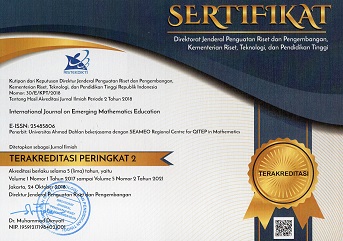- [December 8, 2016] IJEME inisiated by Rully Charitas Indra Prahmana. He requested an application letter to Director of Graduated Program of Universitas Ahmad Dahlan, Prof. Dr. Achmad Mursyidi, M.Sc., Apt., for requesting an e-ISSN (Online) to Indonesian Institute of Science which has elegibility and authority in Indonesia.
- [December 13, 2016] IJEME got e-ISSN (Online) number, 2548-5806 by Indonesian Institute of Science, Decree No. 0005.25485806/JI.3.1/SK.ISSN/2016.12 for Vol. 1, No. 1, March 2017.
2017
- [February 14, 2017] IJEME requested an application letter to Director of Graduated Program of Universitas Ahmad Dahlan, Prof. Dr. Achmad Mursyidi, M.Sc., Apt., for requesting an p-ISSN (Paper) to Indonesian Institute of Science.
- [February 18, 2017] IJEME got e-ISSN (Online) number, 2549-4996 by Indonesian Institute of Science, Decree No. 0005.25494996/JI.3.1/SK.ISSN/2016.12 for Vol. 1, No. 1, March 2017.
- [February 16, 2017] IJEME first edition, IJEME Vol. 1 No. 1 March 2017, published at http://journal.uad.ac.id/index.php/IJEME.
- [August 16, 2017] IJEME indexed in Directory of Open Access Journals (DOAJ) with green tick.
- [March 3, 2018] IJEME has been updated editorial board, such as add more new members of International Editorial Board Members and Reviewers in OJS.
- [March 10, 2018] IJEME submitted for indexing in ASEAN Citation Index (ACI) database.
- Assoc. Prof. Dr. Masitah Syahrill is appointed as the editor in Chief of IJEME.
- The IJEME was accredited by National Journal Accreditation (ARJUNA) managed by Ministry of Research, Technology, and Higher Education, Republic Indonesia with Second Grade (Sinta 2) since Volume 1 Number 1, March 2017 to Volume 5 Number 2, September 2021 according to the decree No. 30/E/KPT/2018.
2022
- Prof. Takuya Baba (Hiroshima University) is appointed as the editor in chief of IJEME
- Focus and Scopus of IJEME in 2016-2021 is listed as follows.
- Realistic Mathematics Education (RME)
Realistic Mathematics Education (RME) is a teaching and learning theory in mathematics education that Freudenthal first introduced and developed. Two of his important points of view are mathematics must be connected to reality and mathematics as a human activity. RME is implemented following three principles, they are: (1) guided reinvention and progressive mathematizing, (2) didactical phenomenology, and (3) self-developed model. Furthermore, the practice of RME also has its own characteristics; they are: (1) phenomenological exploration or the use of contexts, (2) the use of models or bridging by vertical instruments, (3) the use of students own productions and constructions or students contribution, (4) the interactive character of the teaching process or interactivity, and (5) the intertwining of various learning strands. A paper can be included in this topic if the paper accommodates these three principles and these five characteristics.
- Design/Development Research in Mathematics Education
Educational design research is perceived as the systematic study of designing, developing, and evaluating educational interventions (programs, teaching-learning strategies, materials, products, systems) to solve such problems. It also aims at advancing our knowledge about the characteristics of these interventions and the processes to design and develop them. Authors could submit their work, either a validation study or a development study in mathematics education, with a comprehensive description and analysis of every stage.
- PISA Task
The Programme for International Student Assessment (PISA) is a worldwide study by the Organisation for Economic Co-operation and Development (OECD) in member and non-member nations intended to evaluate educational systems by measuring 15-year-old school students' scholastic performance science reading. PISA tasks here refer to the mathematics tasks developed to measure mathematical literacy. It is an individual's capacity to identify and understand the role that mathematics plays in the world, to make well-founded judgments, and to use and engage with mathematics in ways that meet the needs of that individual's life as a constructive, concerned, and reflective citizens. A paper is eligible for inclusion in the PISA task if it provides a comprehensive analysis of the development or the use effect of the task considering the appropriate content, context, and process.
- Mathematics Ability
Mathematics ability refers to the ability (a human construct) to obtain, process, and retain mathematical information (cognitive) and to solve mathematics problems (pragmatic). To maintain the focus of this journal, the scope of mathematics ability includes the following abilities: reasoning, connection, communication, representation, and problem-solving. A paper is eligible for this topic if it comprehensively discusses those abilities.
- ICT in Mathematics Education
The advance of information and communication technology (ICT) has been the concern of all human life, including education. When all students use technology, the education must be the first one to utilize it for the sake of effectiveness and attractiveness. The IJEME welcomes papers focus on the use of ICT in mathematics learning.
- Ethnomathematics
Ethnomathematics is the study of the relationship between mathematics and culture. In a deeper understanding, ethnomathematics refers to mathematics practiced by members of a cultural group who share similar experiences and practices with the mathematics that can be in a unique form. Culture gives diverse and interesting contexts in mathematics learning to be discussed. Therefore, the scope of ethnomathematics is an important part of the focus and scope of the journal.

